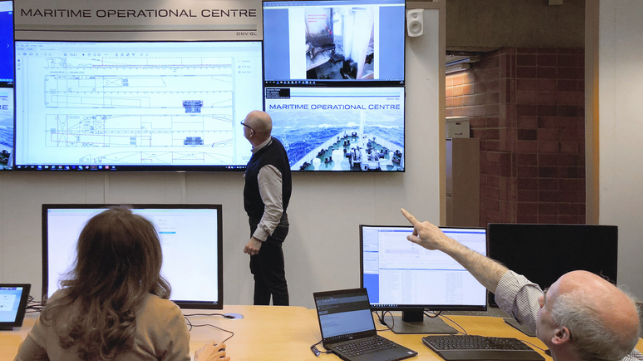search the site
Regulators and Class Turn to Remote Inspections to Keep Ships Moving
Regulators and Class Turn to Remote Inspections to Keep Ships Moving

In the era of COVID-19 and social distancing, remote survey and inspection procedures are proving even more helpful than before, according to regulators and class societies.
Given the current restrictions on person-to-person interaction, the U.S. Coast Guard is now encouraging its inspectors to use remote methods to verify vessel compliance.
Under new guidance, U.S. flagged vessels and U.S. OCS units that are due for required COI renewal, annual inspection, dry dock exams or internal structural examinations may now be eligible for a remote evaluation based on documentary evidence. Eligibility is determined on a case-by-case basis by the local Coast Guard Officer in Charge, Marine Inspection (OCMI).
Under the guidance, the OCMI may choose to accept alternative evidence of compliance – including recent classification surveys, pictures, video, vessel logs and machinery alarm reports – in lieu of Coast Guard attendance onboard the vessel in order to credit a required inspection or exam. A dry dock, pressure vessel, or other non-annual exam may only be credited for a maximum of one year. Alternatively, the OCMI may defer a required inspection or exam for up to 90 days.
Remote surveys
Two of the largest class societies – DNV GL and ABS – have been leveraging remote inspection and survey technology for some time, and they are expanding that capability in order to meet customer demand.
DNV GL first rolled out its remote survey program in October 2018. By using an online connection or video streaming link, a team of remote DNV GL surveyors can provide support to vessels using documentation, images, video (streaming or recorded) and input provided by the owner and the crew onboard. Some periodical survey items can also be handled remotely, subject to flag acceptance, DNV GL says.
“In these challenging times we are seeing the benefits of the full scope of digitalization initiatives that we have been building up over the past few years,” says Knut Ørbeck-Nilssen, CEO, DNV GL – Maritime. “The use of remote surveys has meant that we have been able to limit disruptions to customer operations resulting from travel bans or quarantines involving our surveyors. Ship operators are able to receive immediately updated and verified electronic certificates, which make their business dealing with class, authorities and vendors much more efficient.”
ABS has its own popular remote survey program, and it has recently expanded it in order to help clients maintain business continuity in challenging circumstances. Its remote survey offerings now include drydocking extensions and radio renewals, and it will offer additional remote services for vessel inspections in the near future.
ABS has also extended its remote survey and audit services for its existing equipment manufacturing and external specialist clients in the United States, South America and Europe.
“As organizations rely more heavily on remote and virtual operations, ABS is making it easier for vessel owners and equipment manufacturers to leverage digital applications by offering even more remote surveys and audit options,” said Christopher J. Wiernicki, ABS Chairman, President and Chief Executive Officer.

















